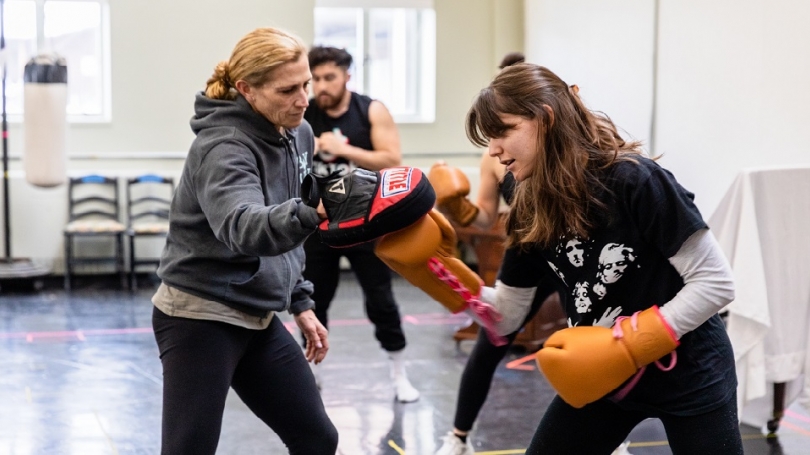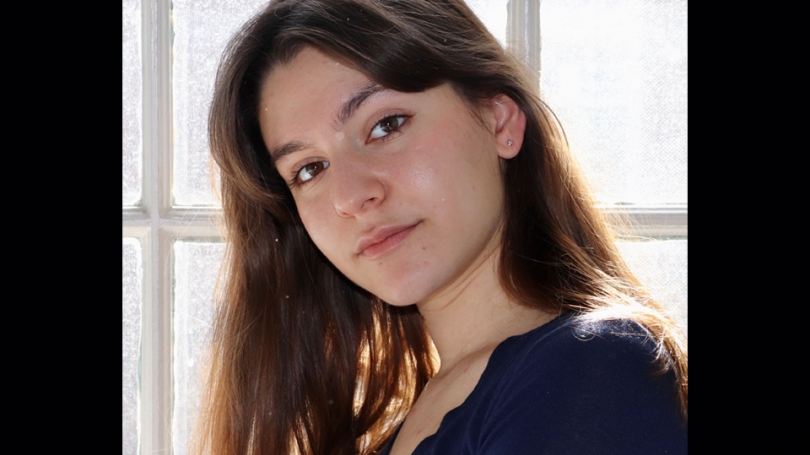"Bruising" Women: Veronica Cavalcanti '23
In anticipation of The Sweet Science of Bruising's US premier, we spoke with the four lead actors who portray female boxers in Victorian England. This is the first of four profiles.
Starting February 21, The Sweet Science of Bruising will be making its U.S. debut at the Hopkins Center. By British theater and TV writer Joy Wilkinson, the play follows the stories of four Victorian-era women, and how their lives become intertwined within the underground boxing scene. Each with her own motivations and backstory, the unlikely group of women find themselves inextricably linked to each other through their struggle to navigate a male-dominated sport at a time when women were granted few freedoms and rights. Who are these women, and how did they find themselves in the boxing ring? Today we meet Anna Lamb, played by Veronica Cavalcanti '23.
Can you talk a little bit about your character, Anna Lamb?
Joy Wilkinson, the playwright, explained to the director that each of the four characters can be broken down into different parts of the body. Polly is the heart, Violet is the brain, Maddie is the body and Anna, my character, is the soul. That was helpful for me to identity. As the soul, she is very family-oriented. The best way to describe her is how she's identified at the beginning of the play: a domestic angel. She represents the house, the home, the children. Raising the future of the UK.
But she is invisible, and is arguably the most invisible out of the four of them. One of the discussions that we had early on in the play was that housewives at the time had very few rights. In that sense, Anna is invisible both in the law, and in the fact that if she were to die, she wouldn't even have her name on the gravestone. It would be the name of her husband.
She really is the soul. She loves her children, and her life revolves around them. But her personality has been smothered by the abusive relationship she is in, and it all comes out when she goes in the ring to box.
How did you prepare to take on the role of a woman living in the Victorian era?
We had a proper historical context education session, where Professor [Carolyn] Dever of the English Department came in and spoke to us about the 18th century. She gave an in-depth characterization of each of the characters, but most of the conversation about Anna revolved around her invisibility. So getting into the character of Anna has largely been an individual process, reading up about the effects of being in an abusive relationship.
One of the hardest things I have to play in this part is when Anna's husband learns that she is boxing and forces her to undergo female genital mutilation. So reading up on that was very difficult. I think that while the domestic wife aspect is different from my reality, it's not so distant that I can't have an image of how to portray it in my mind. But the second half of the play, when Anna is in pain basically all of the time, is something that I couldn't really imagine experiencing.
Do you think that the play projects an empowering story for women?
Yes, I think that it is an empowering story for women, more than just because they box. Boxing is a physical manifestation of empowerment, but there's a moment at the end, where the women are all left with nothing—they definitely don't have rights—but more than that, they have all lost the most important things in their lives. But they all come together in the end, and decide that what they do as a group is bigger than themselves as individuals, and it's about the higher cause. Maybe it's cliche to say that they come together and rise above, but they do. And it's special because it's through this physical lens of boxing.
What do you make of the juxtaposition offered in the title, "The Sweet Science of Bruising?"
I think that the "sweetness" referred to in the title of the play comes from the femininity. But it's also funny, because the boxing is orchestrated by a homosexual man, Professor Charlie. But he has more rights than they [the women] do in general. But in the end, they transcend what he has created, the sweet science of bruising, and take it on themselves. There are also references to bruising throughout the play as well, through the boxing itself and also for Anna, how she is hit by her husband. The same way that people take a horrible thing and make it into something that is empowering, is where the idea of "the sweet science of bruising" comes from.
What made you decide to audition for the play?
I don't like getting involved in plays unless I feel very passionately about what it's saying. But I read the play over break, and I immediately fell in love with the character of Anna. Not just because she becomes a kind of martyr figure, but because, ultimately, she derives her strength from her children. My family is very matriarchal—I come from an odd combination of cultures, but women take an important role in the family structure. So maybe it is because of my family background, but I found that part of Anna to be so admirable—that she moved past the pain for the sake of her two daughters.
How did you become interested in theater?
I always loved History and English, and it was in an English class that I read a Shakespeare play—A Midsummer Night's Dream—and I just felt like theater was the most important medium for me to express all of the different things that I love.
I was born in Rome, but I've lived in the Dominican Republic, Washington, DC, Boston, Switzerland, France, and ended up in Boston. Moving around a lot gave me the ability to experience many types of people and adapt to change quickly and accept all kinds of new cultures. So it probably gave me my love of different characters.
What do you think makes the play so great?
You get to see women fight, but do it out of love. Honestly, it looks really cool, and the effort that has been put into the set and the costumes is amazing. It's a beautiful piece as a whole—there is not one part of the production that's better than another. And the way that the play is set up—with the audience surrounding the actors on three sides—brings the audience on the stage with the cast. They get to be transported to a completely different world for three hours. Honestly, if I wasn't acting in the play, that's something I would want to experience.
Next: Meet Jacqui Byrne '22

